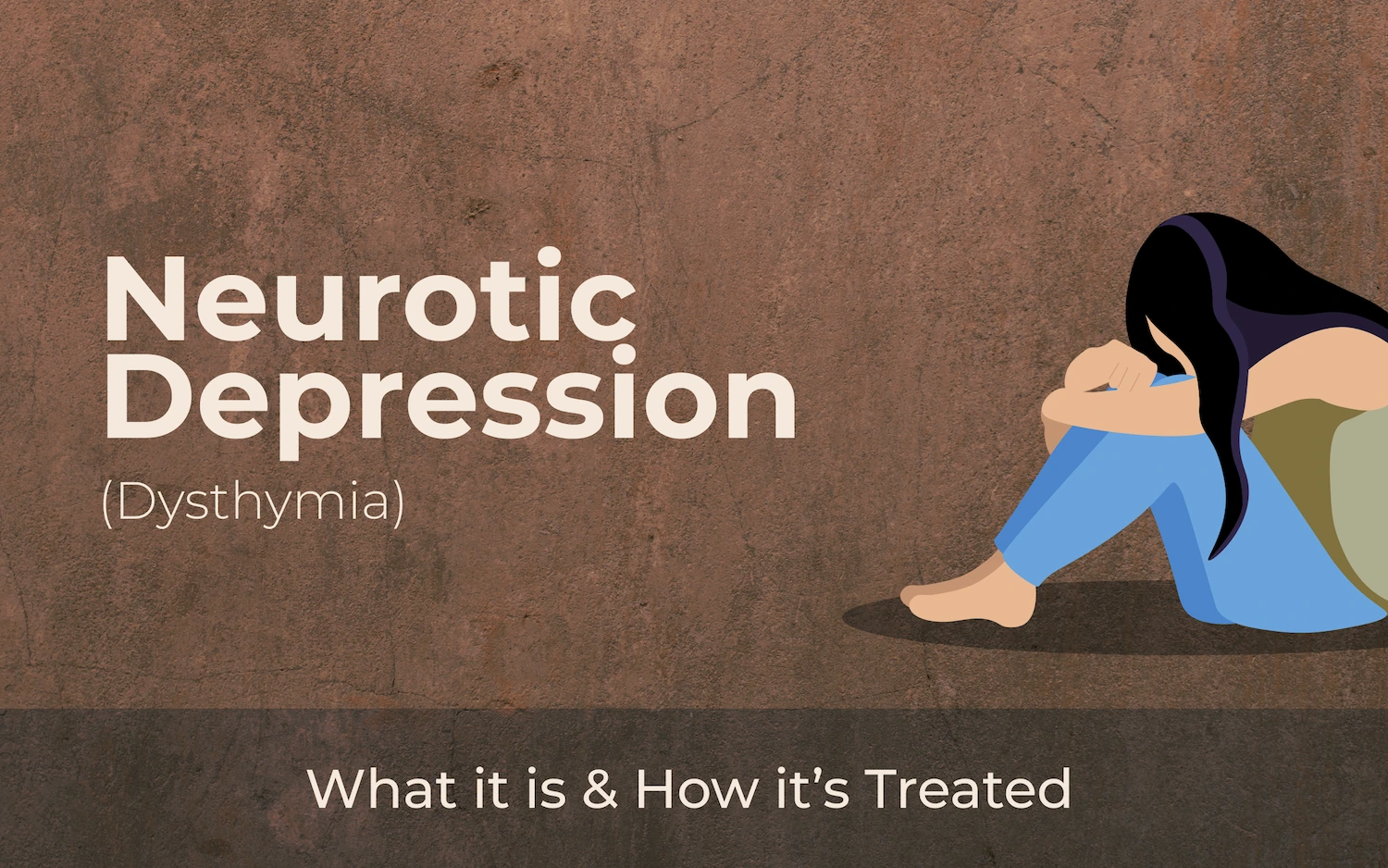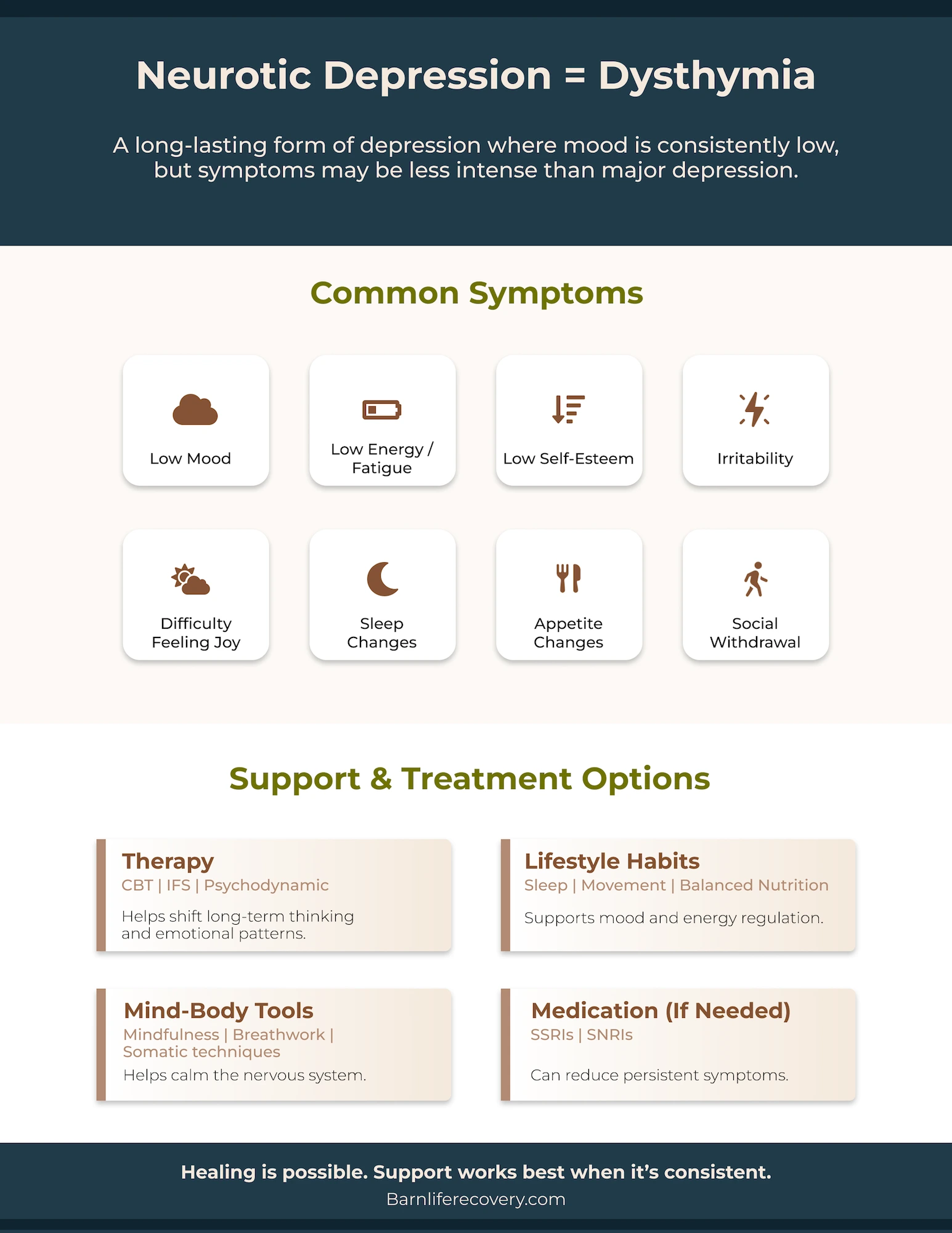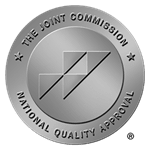What is Neurotic Depression (Dysthymia)?

Neurotic depression (dysthymia), also known as persistent depressive disorder (PDD), is a chronic, low-grade form of depression that quietly weaves itself into daily life. Unlike major depressive episodes that arrive suddenly and dramatically, dysthymia tends to move in slowly and stay for years.
It affects millions of adults and teens each year, often going unnoticed or dismissed. But this steady, persistent sadness is more than a bad mood; it’s a real and treatable condition that deserves care and attention.
Below, we’re exploring what neurotic depression (dysthymia) really means, how to recognize it, and the holistic paths that support deep, lasting healing.
What Is Dysthymia (Neurotic Depression)?
Dysthymia is defined by a low mood that lasts for two years or longer. The symptoms may be mild to moderate, but they’re consistent, like a quiet gray filter over daily life.
People living with dysthymia often describe it as feeling “meh” most of the time. They can function, keeping up with work or family obligations, but motivation takes effort and joy can feel muted.
Historically, the term “neurotic depression” was used to describe this kind of chronic emotional distress, where sadness and anxiety overlapped but didn’t necessarily stop someone from living their life. Today, the term “persistent depressive disorder” is often preferred, as it more accurately reflects the chronic nature of the condition without the “neurotic” label.
How Neurotic Depression (Dysthymia) differs from major depression:
While major depressive disorder (MDD) tends to come in intense waves or episodes, dysthymia is ongoing. The symptoms are often less severe but more enduring, lasting years instead of weeks or months. Some people even experience both at once, a condition known as “double depression.”
Common Symptoms of Neurotic Depression
Because neurotic depression (dysthymia) develops slowly, it can be easy to miss. Many people adapt to their symptoms, thinking this muted version of life is “normal.”
Common signs include:
- Persistent sadness or feeling of emptiness
- Low self-esteem or ongoing self-criticism
- Fatigue or chronic low energy
- Low motivation and difficulty starting tasks
- Irritability or emotional sensitivity that feels hard to control
- Sleep changes (too much or too little)
- Difficulty concentrating or feeling mentally foggy
- Loss of interest in things that once brought joy
- Social withdrawal or feeling disconnected
What Causes Dysthymia?
There’s no single cause of neurotic depression (dysthymia). It’s often the result of overlapping biological, psychological, and environmental factors that build quietly over time. Here are some of the most common influences:
Genetics
A family history of depression or anxiety can increase vulnerability, as certain genes affect how the brain regulates mood-related chemicals like serotonin and dopamine. Still, genetics aren’t destiny, they simply set the stage. Environment, coping skills, and self-awareness can all influence how these tendencies play out.
Brain Chemistry
Imbalances in mood-regulating neurotransmitters can affect how we experience pleasure, motivation, and emotional balance. For many living with dysthymia, this looks like a persistent emotional “flatline.”
Early Life Experiences
Childhood neglect, chronic stress, or emotional suppression can teach the body and mind to live in a low-grade state of sadness or vigilance. When emotions weren’t safe to express, we often learned to numb or minimize them. As adults, this pattern can appear as chronic low mood or disconnection.
Personality Traits
Perfectionism, people-pleasing, and chronic worry can feed dysthymia by creating an internal cycle of pressure and self-criticism. Over time, the need to perform or meet others’ expectations can drain emotional reserves.
Chronic Stress or Trauma
When the nervous system stays in fight-or-flight mode too long, it burns out. Ongoing stress, whether that’s from work, relationships, or trauma, keeps the body on alert and robs it of energy needed for joy and resilience.
Medical or Nutritional Factors
Underlying health issues such as thyroid problems, hormonal imbalances, or nutrient deficiencies can mimic or worsen depression. Blood sugar swings and poor gut health can also impact mood and focus.
How Neurotic Depression Is Treated: Holistic and Clinical Approaches
When it comes to neurotic depression dysthymia causes, treatment works best when it’s both clinical and holistic, addressing not just the brain, but the body, mind, and spirit.
At Barn Life Recovery, we approach depression through this integrated lens, combining evidence-based therapy with mindfulness, nutrition, movement, and community connection.
Psychotherapy (Talk Therapy)
Healing begins with understanding. Therapy offers a structured space to explore the emotional patterns and beliefs that keep dysthymia in place. It can bring awareness to your unconscious habits, protective parts, and outdated stories that quietly shape how you think, relate, and respond to life.
Different therapeutic approaches can meet you at different stages of your healing journey:
- Cognitive Behavioral Therapy (CBT):
Helps identify and reframe negative thought patterns that feed chronic low mood. - Internal Family Systems (IFS)
Gently explores the inner “parts” of ourselves that hold pain, shame, or self-criticism. - Psychodynamic Therapy
Focuses on long-term emotional patterns and how past experiences shape current relationships.
Medication
For some, antidepressant medication such as SSRIs or SNRIs can reduce the severity of symptoms and help regulate mood. Medication isn’t a cure-all, but when used thoughtfully and alongside therapy, it can help restore balance and functionality.
Medication works best when combined with a comprehensive approach that also supports the body and mind, through nutrition, movement, and nervous system regulation. Finding the right medication and dosage can take time, so it’s important to work closely with a qualified mental health professional who understands both the biological and emotional aspects of depression.
Nutrition for Mood Support
What we eat directly affects our mood, energy, and emotional balance. Balanced meals that stabilize blood sugar and support serotonin production can make a noticeable difference in how you feel day to day.Nutrients like omega-3 fatty acids and vitamin D are also helpful for brain health and emotional regulation, while gut health influences everything from anxiety to motivation.
If you’ve ever had a gut feeling, felt butterflies in your stomach, or lost your appetite under stress, you’ve experienced the gut-brain axis in action. This powerful connection between your digestive and nervous systems has a direct impact on how you think, feel, and respond to the world around you.
Exercise and Movement
When we move, the nervous system gets a chance to process stress, complete emotional cycles, and restore balance. Regular, moderate exercise like walking, yoga, weight training, or group movement classes can lift mood, improve sleep, and boost endorphins and other mood-regulating neurotransmitters.
At Barn Life Recovery, our approach embraces movement as self-care and emotional release, not punishment or performance. It’s one of the many ways we help clients feel grounded and balanced in both body and mind.
Mindfulness, Breathwork, and Nervous System Regulation
Mindfulness and breathwork help calm the body’s stress response and create space between stimulus and reaction. Over time, these practices retrain the nervous system to respond with awareness instead of reactivity.
Deep breathing, guided meditation, and other grounding techniques reduce chronic stress patterns and promote emotional balance. They also strengthen the connection between mind and body, which might help you notice what you feel, name it, and move through it with self-compassion instead of judgment.
Healing doesn’t happen in isolation, it happens in connection. Social support is one of the strongest protectors against depression and relapse, offering accountability, empathy, and a sense of belonging.
Healthy relationships help regulate mood, buffer stress, and remind us that we’re not alone in what we feel. Group therapy, peer support, and structured social activities can all provide opportunities to practice connection in safe, meaningful ways. At Barn Life Recovery, our community-based approach reflects our belief that connection is medicine.
Complementary & Holistic Therapies
Holistic healing acknowledges that mind, body, and spirit are deeply connected. Complementary therapies can enhance the effects of traditional treatment by helping the body release tension, integrate emotions, and restore balance.
Approaches such as acupuncture, massage, somatic therapy, herbal supports like adaptogens, and EMDR therapy (when trauma is part of the picture) can help the nervous system feel safe again, allowing deeper emotional healing to take root.
When to Seek Professional Support
If you’re consistently feeling exhausted, struggling to focus, or feeling disconnected even from the things and people you care about most, it may be time to reach out for help. Neurotic depression (dysthymia) is real, common, and treatable. Asking for help is not a sign of weakness, but a courageous act of self-awareness and self-compassion. Contact us to take the next step toward healing.











